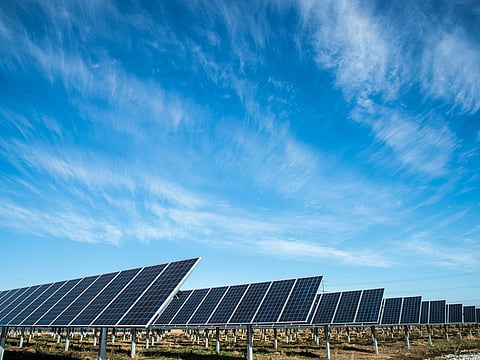Only alliances can ease utility industry's green transformation
Transformation targets will need to keep this key need in mind

Current climate targets are insufficient and don’t fully account for the higher electricity consumption the electrification of economies from renewable energy sources will result in. While electrification provides an opportunity for economic growth, the huge transition of industries on the demand, generation and transmission and storage sides will need government guidance and support.
The global economy is facing a deep recession with the impact of COVID-19. People have seen profound changes in their lives with recession, unemployment and climate change. The World Bank stated that COVID-19 has triggered the deepest recession in decades.
High cost of exposure
The response is stunning and unparalleled: around 20 per cent of global GDP is being made available in various forms of economic and financial stimulus programmes, helping economies and industries to cope.
We - countries, companies, and people - need to design and effectively utilize the worldwide stimulus programmes to accelerate the energy transition. We must realize a world where circular economies, decarbonized energy systems and industries alike are the norm.
But worth it
This can be daunting, given the scale and cost of the required changes. It can also be challenging, given the difficulty in effective capital allocation, balancing risk and reward, and scaling new technologies. But it certainly will be rewarding in terms of environmental, societal and governance impact, economic stimulus, and profitable private investments at the same time.
Financing is an indispensable element of the energy transition and the main challenge for many projects. And in politically unstable, economically fragile geographies, even more so if they have accumulated disproportional sovereign debt.
Full on decarbonisation
Governments of developed countries, and some of the developing countries, are more keenly aware than ever of the urgent need to decarbonize and establish regulatory frameworks and reforms. There are certainly green shoots emerging, with a rising tide of countries signaling serious intent to pursue major renewables programmes and adopt significant decarbonization strategies.
Institutional investors are increasingly re-evaluating their investment strategies and reallocating funds from carbon-intensive investments to carbon-neutral and decarbonizing ventures.
Green signals
September proved to be a landmark moment, not only with the spin-off and listing of Siemens Energy on the Frankfurt stock exchange, as a standalone company focused on the energy transition. Germany issued its inaugural sovereign green bond in September, valued at $7.7 billion.
Egypt also entered the green bond market, with a debut $750 million bond. State-controlled Saudi Electricity Company raised $1.3 billion with a green sukuk, the first of its kind in the Kingdom.
These issuances highlight the growing commitment from sovereign nations and their entities to pursue and fund renewable and green projects, they highlight capital market growing appetite to support such projects and highlight the business potential for the corporate sector.
But having the appropriate regulatory frameworks in place, to make new technologies commercially viable, bankable and attractive to private capital must stand at the beginning of the energy transition.
To facilitate investment, environmental, social, and corporate governance (ESG) must clearly reflect in the core values of projects and corporates. There is a growing focus by equity investors and lenders on ESG-related topics. Consequently, companies and projects with strong sustainability elements potentially have access to a much broader funding basis, given an acceptable risk profile on the commercial side.
Make money available
However, the energy transition and the achievement of global decarbonization targets can only be successful if sustainable financing is available to developing economies. While developing countries account for approximately 60 per cent of CO2 emissions, only 10 per cent of them could advance as planned on their path to meet the climate targets 2030 of the Paris Climate Agreement.
Moreover, more than 800 million people are still without access to any electricity, many more are suffering repeating power outages or unaffordable price levels.
Strong partnerships will be the decisive success factor in creating ecosystems with a significant pipeline of projects in new technology fields and in building basic infrastructure for developing countries. In this increasingly complex world, no player will be able to cover the intricacies, risks, and capital requirements of the energy transformation alone.
We have found that collaboration with strong partners and governments helps solve the financing challenges for the energy transition. That is one of our Top 10 priorities for a successful energy transformation.

- Michael Bueker, Senior Vice-President for Finance Middle East, Siemens Energy.







